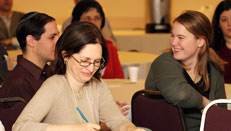 |
||||||||||||
| Who We Are | |
| Audience Accolades | |
| Contact Us | |
| Be a Volunteer | |
| Show Your Support | |
| Rabbi Jay Kelman | |
| Dr. Elliott Malamet | |
| Ilana Kelman | |
| News | |
| Our Speakers | |
| Our Partners | |
| Privacy Policy | |




Torah in Motion tackles the December dilemma
|
|
January 8, 2004 By JENNIFER M. PAQUETTE December 25 can be a dull day for Jews. It's a time of year when Christianity overshadows the calendar, and many of us take various measures - going out to the movies, hiding at home, immersing in Torah study or conversely, avoiding Torah study - to forget Christmas is even happening. This year, right after Shacharit services on the 25th, Beth Jacob v'Anshei Drildz Congregation opened its doors to another all-day Torah in Motion conference co-sponsored by Jews for Judaism. The topic was "Jews, Christians and the Struggle for Truth." The slogan of Torah in Motion - "Confronting the Challenges of Modernity" - is one Beth Jacob's Rabbi Jay Kelman takes seriously. "We can't ghettoize ourselves," he said in an interview. "We must open our ways of thinking." Jewish-Christian relations have never been easy, he said, but we must try to learn from one another nevertheless, especially at this time of year. "Obviously, it's Dec. 25th; it's Christmas, it's Chanukah," Rabbi Kelman said. The goal of Torah in Motion is to engage in "issues which are relevant to the modern world. even if they are different or controversial." The conference talks made comparisons between Christianity and Islam, evaluated talmudic references to Jesus, explored concepts of idolatry within Christianity and examined the importance of revelation in both religions. Torah in Motion has previously addressed such topics as debunking Torah codes and drug and alcohol use among religious teens. Its speakers avoid simplistic answers, taking what Rabbi Kelman calls a "critical view. rooted within a traditional framework." The last topic of the day was "Mistakes and Misconceptions: What Jews Do Not But Should Know About Christians and Christianity," presented by Herb Basser, an Orthodox rabbi and professor of religious studies at Queen's University. Basser pointed out that several Christian doctrines may be less exclusively so than we assume. The Jewish position on issues such as faith healing, Pharisees, the Trinity or the role of the messiah is never one we should take for granted. Many Jews believe that vicarious atonement, where one person's death heals the sins of another, is a uniquely Christian idea. However, Basser said, there are many Jewish traditions from which this idea is drawn. For instance, the death of Miriam is connected by the commentator Rashi with the laws of the red heifer: "Just as sacrifices [like the red heifer] atone, so does the death of the righteous atone." When we open our eyes to Christian scholarship, we find surprises, said Basser. Sir Isaac Newton, for instance, was in his day the third greatest Talmudist in England. "He was castigated by his bishop for reading Talmud [in the original], and never going to church. he knew more than most 17th-century rabbis." We may view Christianity as a "daughter religion," but that doesn't do justice either to its similarities or to our own religious needs, Basser said. Christianity began evolving at the same point as modern rabbinic Judaism as separate "strands" of the same religion. Basser called it a "sister religion. a kind of Judaism that Jews rejected en masse at a certain point." Though we don't accept Christianity's central tenets, Basser feels that its emphasis on moral law and on personal connection with God are "worth thinking about." Rabbi Kelman agrees. "Even in its worst forms - not to mention the Christianity of today - it is not all bad." Christian decorum, for instance, has enriched our spirituality through quiet services and inspirational sermons. For more information about upcoming Torah in Motion programs, visit www.torahinmotion.org or call 416-633-5770. Reproduced with permission from The Canadian Jews News. |

 |
 |